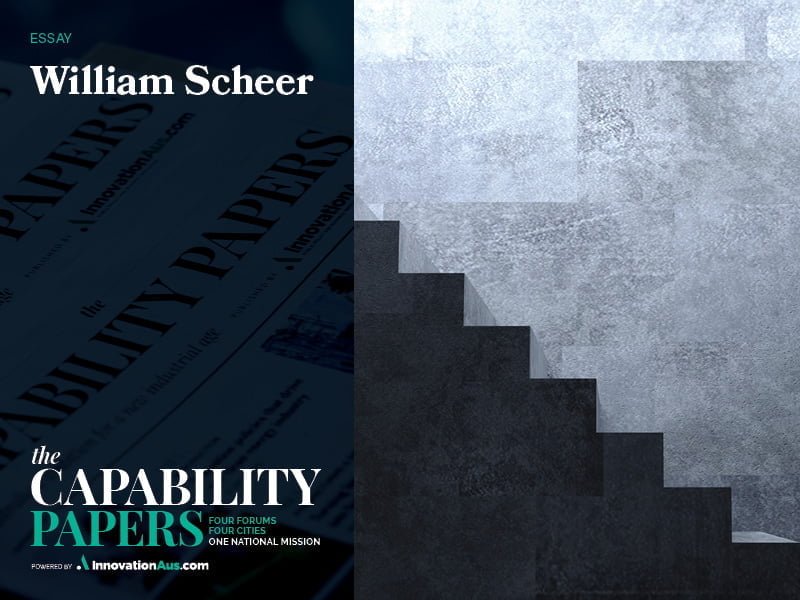The Australian government serves every individual and business that interacts with Australian laws and regulations. It is a massive and intricate conglomerate, encompassing diverse organisations with a multitude of interfaces and technologies.
Unfortunately, this complexity can mean that people and businesses are forced to navigate the intricacies of government, rather than experiencing the seamless ‘customer-centric’ approach that is the hallmark of leading private sector providers.

And yet the federal government has a grand vision for our nation – to position Australia as a leading digital economy and society by 2030.
To turn this vision into reality, our government systems must be nothing short of world-leading, keeping pace with technological development and adoption.
After all, these systems are an integral part of the enabling capability that will drive our domestic excellence and competitiveness on the global stage.
GovTech is therefore a critical enabling capability that requires systematic development by government and the private sector, including investing through the National Reconstruction Fund.
Government as an anchor client
The power of government as an anchor client cannot be underestimated. In our domestic market, where small to medium enterprises dominate, government stands as a significant customer.
And as one of the largest sovereign consumers, producers, and custodians of data, the government is also uniquely positioned to leverage game-changing technologies like artificial intelligence for the betterment of our society.
Becoming an anchor client would be a game-changer for aspiring and established technology firms, not only bolstering their domestic business, but also enhancing their international credibility and facilitating expansion.
However, the path to success is not easy for startups and small businesses.
Navigating the complexities of government procurement and competing against established incumbents can be incredibly daunting.
It is imperative for all levels of government to foster partnerships, implement smart regulations, practical standards, and position government service delivery to tap into the evolving dynamics between businesses, consumers, and technology within the natural systems of our economy.
The holy grail of interoperability
Poor interoperability creates friction across the whole government ecosystem, adding time and cost to hundreds if not thousands of touchpoints.
It also sits at the heart of many of the barriers for domestic firms in working with government, including a bias towards incumbency of single large providers to try and outsource interoperability challenges.
“Achieving interoperability is crucial for the delivery of integrated citizen-centered public services and the path to a data-driven public sector. Interoperability plays a crucial role in enabling administrations to overcome siloed practices towards coordinated, connected, and responsive public sectors capable of better responding to the increasing demands of our economies and societies.” – World Bank GovTech Global Partnership Interoperability Working Group
Traditionally, the key to unlocking interoperability has been the establishment of standards that define data and information exchange protocols.
However, in the fast-paced race to grapple with emerging technologies, it often feels like for every effort made to harmonise regulations, two new ones spring up, each with its own set of definitions.
Given that standards development is usually a lengthy process, it is near impossible to effectively maintain, let alone increase, interoperability using traditional methods.
It is high time that the government and industry join forces and explore innovative new ways to achieve effective interoperability.
We must also harness the power of emerging technologies as our ally in overcoming this critical bottleneck.
Accelerating interoperability using GovTech sandboxes
Drawing from my own experience in developing mission-critical systems for Defence and Air Traffic Control, I understand firsthand the paramount importance of robust systems integration.
In these complex domains, establishing a rock-solid approach to integration is the key to success, and to a resilient system.
The ability to swiftly create integration environments for testing interoperability is an invaluable capability that I have witnessed in action.
Our firm is often called upon to establish these sorts of environments for government projects as one-off exercises, and usually because it is just “too hard” for the government agency to stand up an environment using its current capabilities.
With this perspective in mind, I firmly believe that the time has come for the government to establish a groundbreaking initiative: a standing whole-of-government integration environment capability, let’s call it ‘APSLabs’.
APSLabs would serve as a powerful tool to address the multitude of internal government integration challenges, while also fostering collaboration with industry partners.
Picture a dynamic and open ecosystem where various stakeholders can come together, unleashing their collective expertise and resources to overcome integration hurdles.
More than just a collection of whiteboards, these APSLabs would be capable of rapidly spinning up relevant reference architectures encompassing business processes, systems, and data.
These agile and adaptive virtual playgrounds would provide the perfect environment for deploying and testing specific use-cases.
The result? A fertile ground for breaking through legacy issues or for innovation, where ideas can be transformed into tangible solutions, and interoperability can be fine-tuned.
By establishing APSLabs, we would empower government agencies and industry players to collaborate, to experiment with novel approaches and evolve interoperability standards, and to co-create solutions that seamlessly integrate into the broader government ecosystem.
This would become a catalyst for collaboration, a breeding ground for innovation, and a driving force for actually achieving re-use across whole of government.
Building capability through APSLabs
In the fast-evolving landscape of digital skills, both the Australian Public Service (APS) and the nation as a whole face a formidable challenge.
Attracting and nurturing these skills has become a top priority for government and businesses alike.
The open and transparent nature of an APSLabs environment would serve to break down barriers in the ecosystem.
It would act as a hub, bringing together public servants, academia, domestic suppliers, and multinational corporations, fostering a vibrant exchange of knowledge and a collective drive to build essential digital skills.
For domestic firms willing to embark on the journey, APSLabs would offer an opportunity to gain an in-depth understanding of government intricacies. It would provide a gateway to exploring the challenges and systems that shape our nation.
Furthermore, it would be a conduit to tap into the vast resources of Australian research institutions, opening doors to global expertise and cutting-edge advancements.
A better pathway to value for money
The traditional approach to government technology investment and procurement often falls short in delivering optimal value for money.
Reliance on large business cases with multi-year plans and solutions can lead to untested assumptions, undercooked risk management strategies and flawed procurements.
However, a new trend is emerging, one that champions discovery and proof of concept work to contest and inform investment decisions.
This approach recognises the importance of tackling risks head-on and breaking down implementation into manageable chunks.
This is where APSLabs would offer a procurement pathway that has the potential to transcend conventional methods and pave the way for transformative outcomes.
By operating within this open playing field, suppliers would gain a powerful platform to showcase their capabilities, demonstrate their worth, and showcase their commitment to delivering value for money.
It would become a springboard for establishing trust and credibility with government stakeholders, enabling more accurate predictions of value for money in procurement decisions.
Utilising just a portion of the annual government spend on technology business cases is probably enough to fund operating APSLabs, let alone considering the potential value for money benefits.
Moreover, APSLabs would open doors for informed investors to throw their weight behind companies and solutions that demonstrate a clear pathway to scale domestically and globally.
With a deeper understanding of the work being done within this open and collaborative environment, investors could confidently invest in ventures that exhibit tremendous potential and promise.
Exporting Australian values through GovTech
The Australian government must turn outwards and not inwards to solve the big challenges and seize the significant opportunities in front of us.
It must champion connecting government jurisdictions, academia and industry. As many smart and motivated minds as possible should be turned to making technology deliver benefits rather than harms to society.
In addition to building internal government capabilities, the government should leverage its purchasing power to develop domestic GovTech expertise, and to adopt critical emerging technologies such as AI, data science, and software engineering within the public sector.
By reducing barriers and encouraging collaboration with small to medium enterprises, a robust domestic GovTech sector can be cultivated, bringing economic benefits and allowing Australian societal values to be embedded in the use of transformative technologies.
Ultimately, it is the responsibility of those who govern and use technology, rather than the engineers and scientists, to determine the direction of progress.
By fostering connections, promoting understanding of the public interest, and facilitating collaboration, the government can enhance the chances of achieving better outcomes and creating a brighter future for all.
William Scheer is the founder and Chief Executive Officer of Reason Group, a trailblazing Australian business and technology services firm specialising in digital government. William’s technology foundation was forged developing mission-critical combat and air traffic control systems across the globe. A veteran of the dotcom boom and bust, he has grown technology and advisory businesses serving a variety of sectors, including telecommunications, banking, resources, and government. As a seasoned expert in the technology industry, William has played a role in shaping some of Australia’s largest government reforms.
Do you know more? Contact James Riley via Email.

